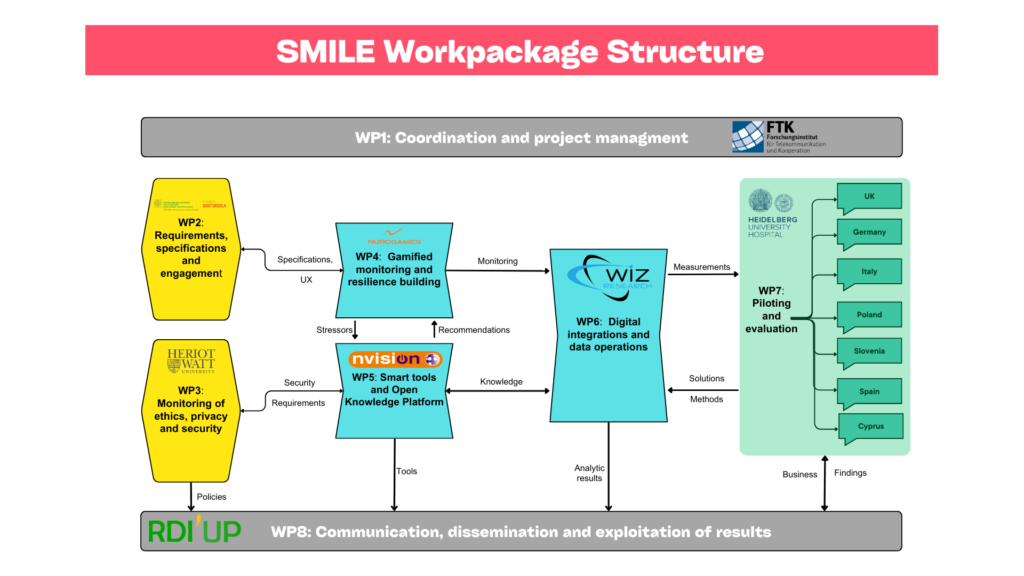
WP1 Coordination and Project Management
(Lead: FTK)
WP1 aims to ensure proper coordination between partners, meet project deliverables dates, monitor and control the technical and scientific quality of the project, and establish effective communication with the European Commission (EC). It includes the identification of conflicts and proposition of solutions to avoid early risks. The project coordination and management is designed to support and actively facilitate the implementation of the SMILE project in this way.
WP2 Requirements, Specifications and Engagement of Stakeholders (Lead: IRCCS AOUBO)
WP2 is the strategic starting and finishing point in providing methodology, approach and strategies to clearly identify stakeholders and their requirements, interact with them through a deeper assessment of their requirements and to build an engagements activity plan. The focus is to establish a framework to map individual needs with respect to the “indicators” from across a matrix of influences which form the social and environmental triggers. To capture these indicators, a data-driven approach will be employed. Scoping will inform about where and how many accessible elements or features are required (APA 5-step framework), accessibility standards to design pragmatic scenarios, and engagement of participants.
WP3 Monitoring of Ethics, Security and Privacy
(Lead: HWU)
The goal of WP3 is to take cross-cutting steps to ensure that the privacy, legal and ethical aspects follow the highest standards as per national and international laws and directories and that these are acceptable to participants and stakeholders. This will ensure all rights and dignity for all in any way involved with the project are well protected, especially those of adolescents in pilots. It will examine how legislation might facilitate the implementation of SMILE.
WP4 Gamified Monitoring and Resilience Building
(Lead: NURO)
The objective of this WP is to deliver solutions that will contribute to the resilience of adolescents to digital stressors by helping them to find different personalised pathways to dealing with psychological distress, anxiety and depression. As for the first step in resilience building, the WP will deliver an elaborative sensing framework and an explainable AI for self-monitoring and risk assessment. It consists of processing multiple spontaneously generated behaviour cues (i.e. digital biomarkers) to collect data about mental health and identify non-specific symptoms of stress, anxiety and depression.
WP5 Advanced Tools and Open Knowledge Platform
(Lead: NION)
The objective of WP5 is to aggregate the tangible results, such as self-assessment tools, gamified interventions, training and psychoeducation, evidence-based knowledge, and decision support systems in a coherent package as the Open Knowledge Platform (OKP) and to make it accessible to outside parties (e.g., adolescents, parents, clinicians, policy makers) via the Knowledge Management Ecosystem Portal (KM-EP).
WP6 Digital Integrations and Data Operations
(Lead: WIZ)
WP6 focuses on the integration of digital tools and data operations across all stages of the design, development and testing activities. The primary objective of this WP is to integrate, collect, store, and offer tools for in-depth analysis of data related to different exposures, treatment and depression status. Furthermore the WP will design novel tools to integrate, analyse and understand the experimental data and the shared information and experiences.
WP7 Piloting and Evaluation
(Lead: UKH)
The main objective of the WP is to successfully perform the piloting and evaluation of the SMILE KM-EP in 7 different sites in Europe. The pilots in Germany, Italy, UK, Poland, Spain, Cyprus and Slovenia will be gathering enough and appropriate data to perform an adequate evaluation and the generation of a set of deployment guidelines for the potential later expansion of the system.
WP8 Dissemination, Communication and Exploitation
(Lead: RDIUP)
The core objective of WP8 is to manage and implement effective, strategic dissemination and communication activities with the aim to increase awareness, stimulate acceptance and fostering uptake of the SMILE solutions, facilitating knowledge transfer towards and supporting further uptake at EU and global level. An integrated impact-driven approach will be adopted through a multi-stakeholder and multi-channel strategy.